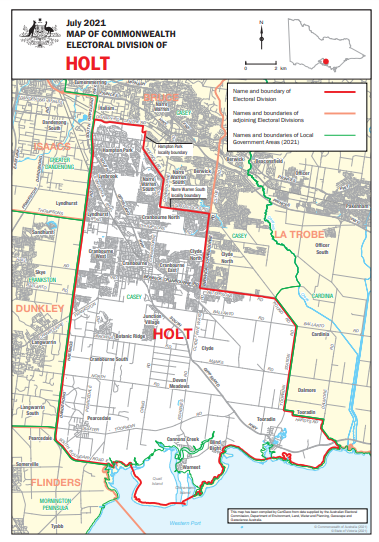|
|
|
|
| Adam Carr's Election Archive
|
Australian federal election, 2022
Division of Holt, Victoria
Named for: Rt Hon Harold Holt (1908-67), federal MP 1935-67, Prime
Minister 1966-67
South-eastern Melbourne: Berwick, Clyde, Cranbourne, Hampton Park, Pearcedale
State seats: Parts of
Cranbourne,
Hastings and
Narre Warren South
Local government areas: Parts of
Casey
Borders with:
Bruce,
Dunkley,
Flinders,
Isaacs and
La Trobe
Enrolment at 2019 election: 106,830
Enrolment at 2022 election: 107,465 (+00.6)
1999 republic referendum: No 51.3
2018 same-sex marriage survey: Yes 50.7
Sitting member: Hon Anthony Byrne (Labor):
Elected 1999 by-election, 2001, 2004, 2007, 2010, 2103, 2016, 2019 (Retiring 2022)
2007 Labor majority over Liberal: 11.6%
2010 Labor majority over Liberal: 13.2%
2013 Labor majority over Liberal: 9.1%
2016 Labor majority over Liberal: 14.2%
2019 Labor majority over Liberal: 8.7%
2019 notional Labor majority over Liberal: 8.9%
Liberal two-party vote 1983-2019
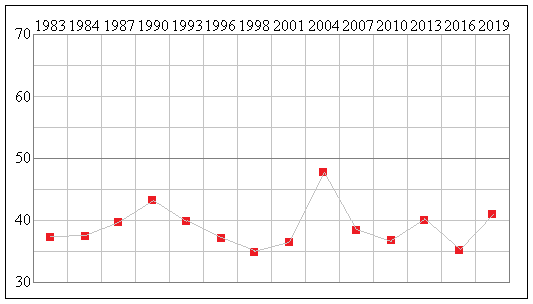
Status: Fairly safe Labor
Best Labor booths, two-party vote: Coral Park (71.9), Kilberry Valley (71.1), Hampton Park East (70.6),
Rangebank (69.3), Clyde North (68.1)
Best Liberal booths, two-party vote: Devon Meadows (62.0), Blind Bight (57.8), Pearcedale (57.9),
Cranbourne South (57.1), Hillsmeade (46.6)
2019 results
Statistics and history
Candidates in ballot-paper order:
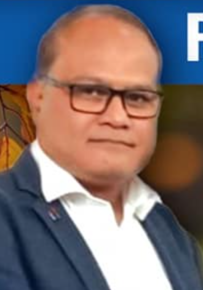 |
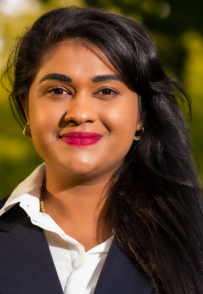 |
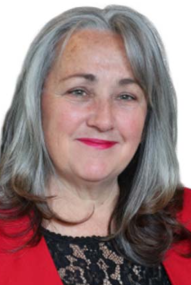 |
 |
1. Ravi Ragupathy
Independent |
2. Cassandra Fernando
Australian Labor Party |
3. Gerardine Hansen
United Australia Party |
4. Sandy Ambard
Pauline Hanson's One Nation |
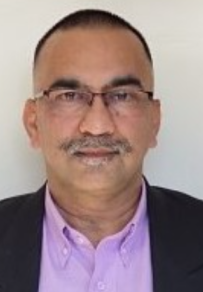 |
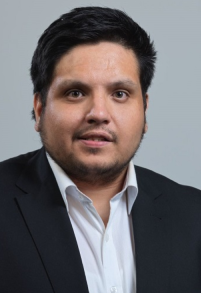 |
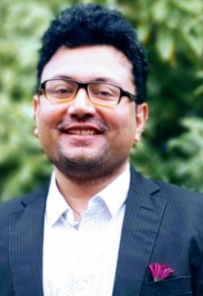 |
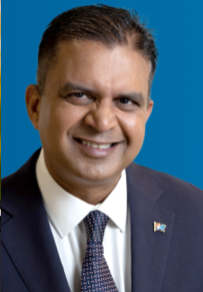 |
5. Gregory Saldanha
Australian Federation Party |
6. Matthew Nunez-Silva
Liberal Democrats |
7. Sujit Mathew
Australian Greens |
8. Ranj Perera
Liberal Party |
Candidate websites:
Cassandra Fernando
Gerardine Hansen
Sujit Mathew
Matthew Nunez-Silva
Ranj Perera
Ravi Ragupathy
Gregory Saldanha
Division of Holt
Holt was created in 1969, based on the manufacturing centre of Dandenong in Melbourne's south-eastern suburbs.
Subsequent redistributions, however, moved the seat further out, removing Dandenong and adding the commuter suburb of
Cranbourne. On its recent boundaries Holt was the country's foremost mortgage belt seat - it had the highest proportion
of families with
dependent children and the highest proportion of dwellings being purchased of any electorate. It is thus acutely
sensitive to interest rates, which nearly cost Labor the seat at the 2004 election.
Gareth Evans, Foreign Minister in the Hawke-Keating
Government, won Holt in 1996 after a long career in the Senate. He departed after Labor's defeat in 1998.
Anthony Byrne, Labor MP since the 1999 by-election which followed Evans's resignation, was chief executive officer
of the Anxiety Disorders Foundation of Australia before his election. He was a parliamentary secretary in the first
Rudd Government but was dropped after the 2010 election. He was chair of the Joint Statutory Committee on Intelligence
and Security from 2010 to 2013. In March 2022 he announced his retirement.
The 2018 redistribution removed the Labor strongholds of Doveton and Hallam, and added a stretch of semi-rural
territory around Pearcedale and Tooradin. The 2021 redistribution has removed some of the rural areas, but has also removed
Labor territory in Narre Warren. These changes substantially reduced the Labor majority, but not enough to
give the Liberals a real chance of winning the seat. The new Labor candidate is Cassandra Fernando, an organiser with the
Shop Distributive and Allied Employees union (SDA). The Liberal candidate is Ranj Perera, Chief of Staff to the Minister
for Multicultural Affairs, Jason Wood. The Greens candidate is Sujit Mathew, whose occupation is not stated. All three major
candidates are of South Asian background.
Demographics:
Median weekly household income: $1,579 (Australia $1,438)
People over 65: 8.3% (Australia 15.8%)
Australian born: 51.0% (Australia 66.7%)
Ancestry: Indian 8.3%
Non-English-speaking households: 36.3% (Australia 22.2%)
Catholics 22.2% (Australia 22.6%)
Hinduism: 6.0%
No religion 25.9% (Australia 29.6%)
University graduates: 16.6% (Australia 22.0%)
Professional and managerial employment: 23.6% (Australia 35.2%)
Employed in manufacturing and construction: 32.8% (Australia 22.9%)
Paying a mortgage: 57.8% (Australia 34.5%)
Renting: 22.0% (Australia 30.9%)
Traditional families: 48.5% (Australia 32.8%)
Back to main page
|
|

